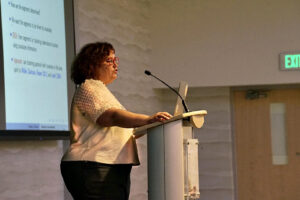The 2023 EnviBayes Workshop on Complex Environmental Data took place from September 18-20 and was held at Colorado State University. The workshop brought together 80 researchers, practitioners and students to explore innovative developments within the field of environmental and ecological statistics.
Funded by CSU’s College of Natural Sciences and Department of Statistics in addition to the National Science Foundation, the workshop aimed to “provide sub-communities within environmental and ecological statistics with a venue to share cutting-edge advancements within their own networks to further spark deeper knowledge gains,” said Andee Kaplan, an assistant professor in the Department of Statistics and chair of the organizing committee.

Lane Drew, a student at Colorado State University who attended the workshop, shared his insights on the primary objectives and overall experience of the event. “This swath of sessions covered a wide range of topics relevant to the issues we face as researchers and as inhabitants of a rapidly changing world,” Drew said.
“The primary objective of the EnviBayes Workshop was to identify some of the myriad challenges researchers face when dealing with complex environmental data and highlight strategies for addressing these challenges within a primarily Bayesian framework,” Drew said.
EnviBayes is the environmental section of the International Society for Bayesian Analysis, a professional organization that promotes the development and application of Bayesian statistics. Bayesian methods frame scientific questions in terms of the data as well as what prior knowledge exists surrounding a line of inquiry. By updating our prior knowledge through the gathering of new data, a new vision of the world can emerge. This is a flexible way to analyze and interpret data while still accounting for uncertainty.
The workshop covered a diverse array of topics, all linked by the common thread of complex environmental data. Sessions delved into fast computation and scalability, remote sensing data, exposure and environmental health, machine learning approaches, extreme value models and animal movement. Highlights of the meeting included the student paper competition, showcasing promising research contributions from graduate students in the discipline, as well as three keynote speakers from the University of California, Irvine, Duke University and NASA’s Jet Propulsion Laboratory.
“The diversity of topics related to complex environmental data was impressive. It also really showcased the strengths of our department, since several of our faculty gave such high-quality and well-received talks,” said Ben Shaby, an associate professor in the Department of Statistics and a member of the organizing committee.
The discussions and presentations percolated beyond the scheduled sessions, providing ample opportunities for participants to engage and connect. A trip to Lory State Park allowed attendees to discuss new ideas and establish meaningful social connections, fostering future collaborations and innovations.
The workshop highlighted the flexibility of the Bayesian framework by incorporating different approaches in the presentations.
“The contrast helped to highlight the value and flexibility of the Bayesian framework and the places where another approach may be warranted or even preferred,” said Lane Drew, a CSU Statistics PhD student. “As a student, seeing the wide range of applications and the community of researchers working on these challenging and relevant problems was invaluable.”
The 2023 EnviBayes Workshop successfully achieved its goals of promoting knowledge sharing, addressing challenges and fostering collaboration within the environmental and ecological statistics communities, according to Drew.
“It was exciting to be able to host so many of the world’s top experts on Bayesian and environmental statistics here at CSU,” said Shaby.